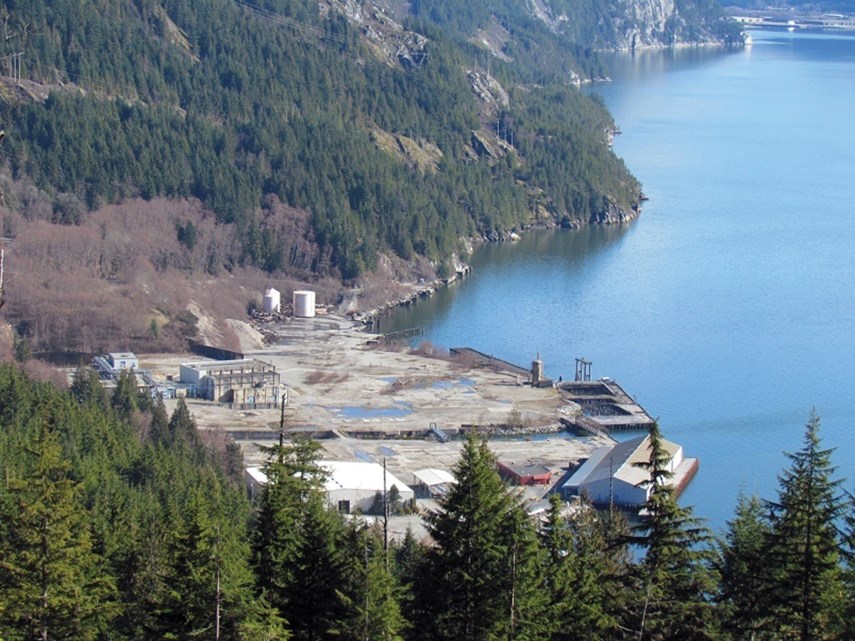Liquefied natural gas tankers may soon be navigating Howe Sound following Squamish Nation council’s Nov. 21 vote supporting three impact benefit agreements worth $1.1 billion.
The financial breakdown of the agreement between the Squamish Nation, Woodfibre LNG, FortisBC, and the provincial government was first reported by Bob Mackin of The Breaker and confirmed by the Squamish Chief.
The agreement includes $225.6 million in cash payments to be made over 40 years.
The Squamish Nation is also set to receive training, education upgrades and preferential employment for Squamish Nation members valued at a total of $16.1 million.
Squamish Nation businesses could also receive up to $872.4 million in the event they are qualified and win the bids.
“Actual profit from the contracts, if any, accruing to Nation or member businesses would be a small fraction of that total,” according to a release from the band.
As part of a 422-hectare land deal, nine parcels of land in the Squamish Valley will be transferred to the band for housing and economic development.
“Revenue collected from this project will go to the Squamish Nation and contribute to programs and services,” stated a release from the band.
The approval also includes: “legally binding conditions issued under the Squamish Nation’s environmental assessment process,” the release stated.
While the total value of the contributions was verified by Squamish Nation spokesman and councillor Khelsilem, it remains unclear how much money each party contributed to the Nation.
The provincial government indicated it will release information about the agreement following “internal government approvals,” according to an email from Minister of Indigenous Relations and Reconciliation Scott Fraser.
Following what Khelsilem described as a contentious debate, council voted 8-6 in favour of the agreement.
The decision was a disappointment for environmental organization My Sea to Sky, which was founded in 2014 and has repeatedly opposed the LNG plant.
“People are scared about the very real consequences that climate change is already having on our communities. We cannot build new fossil fuel infrastructure when we are facing a climate crisis that threatens the future of our planet,” wrote marine scientist and My Sea to Sky executive director Tracey Saxby on the organization’s website.
Citing the 17,759 signees of an online petition opposing the LNG plant, Saxby pledged to continue the fight.
“We have grave concerns about the impacts that Woodfibre LNG will have on wildlife in Howe Sound, the lack of safety regulations for LNG tankers in Canadian waters, the costs of air pollution to human health, the subsidies that are unfairly propping up a sunset industry,” she wrote.
Byng Giraud, country manager and vice-president of corporate affairs with Woodfibre LNG Limited, noted in a statement to The Chief that the $1.6-billion Woodfibre LNG Project is the first industrial project in Canada to be awarded an environmental certificate by an Indigenous government.
“We believe the Squamish Nation process and the resulting conditions are an important pathway to economic reconciliation,” Giraud said in a statement to The Chief.
This is the first major development involving the Nation and Woodfibre since the new council — with eight new members and eight returning members — was sworn in on April 22.
Some of the new members said they did not support the project during their election campaigns, so there was some speculation in the community about whether these agreements would ultimately be supported.
Khelsilem stated in a tweet prior to the vote that an agenda item to consider sending the Woodfibre LNG Impact Benefit Agreements to a referendum had been taken off the agenda.
“A majority of Council voted to have the agenda item removed. We won’t be discussing doing a referendum with our members on Woodfibre LNG,” Khelsilem tweeted.
The LNG facility – which is expected to export and process approximately 2.1 million tonnes of LNG each year from the former pulp mill site southwest of Squamish – won federal approval in 2016 after it was deemed unlikely to hurt the environment.
The municipal councils of West Vancouver and Lions Bay had each called for the federal government to ban the passage of LNG tankers in Howe Sound due to environmental concerns related to the prospect of 40 double-hulled LNG tankers departing from Squamish annually.
In 2016, Woodfibre LNG announced a deal with Guangzhou Gas Group Co. to deliver one million tonnes of liquefied natural gas to the Chinese gas company every year from 2020 to 2045.
At its peak, construction of the plant will likely require 650 jobs, according to Woodfibre LNG. Once operational, the export facility is slated to have a staff of 100 full-time workers.
The Squamish Nation has close to 4,000 members, approximately 3,000 of which are eligible voters. The Squamish Nation traditional territory includes 6,700 square kilometres with 23 village sites and 24 reserves.
– with files from North Shore News



